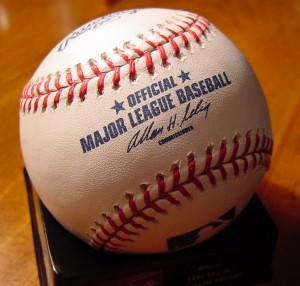During this week in 1922, the Supreme Court made an important ruling which helped shape Major League Baseball as we know it today. The decision was Federal Baseball Club of Baltimore v. National League. Oliver Wendell Holmes wrote in his majority opinion that exhibitions of baseball are purely state affairs, and thus not subject to the Sherman Antitrust Act. Enacted in 1890, the Sherman Act sought to prevent monopolies from developing and to promote competition in the marketplace. In 1911, the Supreme Court applied the Sherman Act to break up the Standard Oil conglomerate. The Federal Baseball Club of Baltimore felt that Major League Baseball should be met with the same fate.
 In 1914 the Baltimore Terrapins, of the upstart Federal League, attempted to lure players away from the National and American leagues of Major League Baseball. As a result, players’ salary demands skyrocketed and the National and American leagues made buyout offers to all of the Federal League club owners in a successful effort to disband the League. The Baltimore Terrapins owners were not happy with the offer they received. With their lawsuit, the Terrapins owners hoped to break up the monopoly held by Major League Baseball.
In 1914 the Baltimore Terrapins, of the upstart Federal League, attempted to lure players away from the National and American leagues of Major League Baseball. As a result, players’ salary demands skyrocketed and the National and American leagues made buyout offers to all of the Federal League club owners in a successful effort to disband the League. The Baltimore Terrapins owners were not happy with the offer they received. With their lawsuit, the Terrapins owners hoped to break up the monopoly held by Major League Baseball.
Holmes’ ruling in Federal Baseball effectively carved out an exemption for Major League Baseball from government regulation. He stated that a ball club’s travel from city to city is only incidental, and therefore not the type of interstate commerce necessary to justify government interference through the Commerce Clause. This somewhat controversial interpretation of the Commerce Clause stands in contrast with later cases where the Court was expanding the government’s reach through the Commerce Clause.
Even when given the opportunity to overrule Federal Baseball, the Court has always found a way to uphold it. In the early 1970s, St. Louis Cardinals outfielder Curt Flood challenged perhaps the most unfortunate consequence of baseball’s antitrust exemption — the reserve clause. The reserve clause was written into every Major League Baseball player contract and gave each team the power to reserve its rights to a player, to the exclusion of all other teams, when it came time to renew a player’s contract. In other words, if a player wanted to continue playing baseball at the end of his contract, the only team he could sign with would have been his current team. Flood filed his lawsuit after the Cardinals traded him to another team against his will and Major League Baseball refused to let him solicit bids from other teams. Relying on the doctrine of stare decisis (“to stand by things decided”), the Court in Flood v. Kuhn chose not to overrule Federal Baseball. Flood lost his case, but paved the way for the free agency system that is in place today.
What if the antitrust exemption is repealed tomorrow? Team relocation could become more common. Baseball is the only professional sport with an antitrust exemption. Accordingly, Major League Baseball enjoys a sort of veto power over team relocation which has become commonplace in other sports. The minor league system would change dramatically. The reserve clause, which is still in place in the minor leagues, would be subject to a legal challenge. With no reserve clause, the “farm system” in which teams draft and develop young talent, often right out of high school, would completely change. The salary demands of minor league players would increase and teams would no longer be able to afford to keep a well-stocked pond of developing talent.
There is no doubt that professional baseball is interstate commerce by today’s standards, or even the standards in place at the times the matter has come up before the Court. Two Supreme Court challenges and decades of Congressional inaction later, Federal Baseball still stands. Fearing an unforeseen consequence of antitrust exemption repeal, perhaps no Justice or Congressperson wants to be known as the person who killed baseball.
